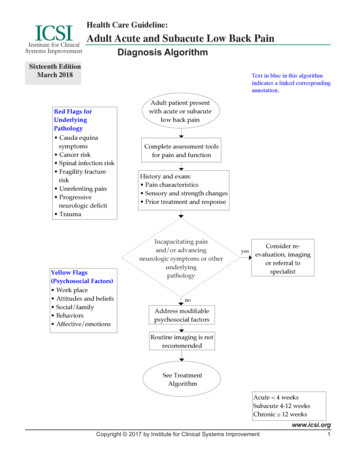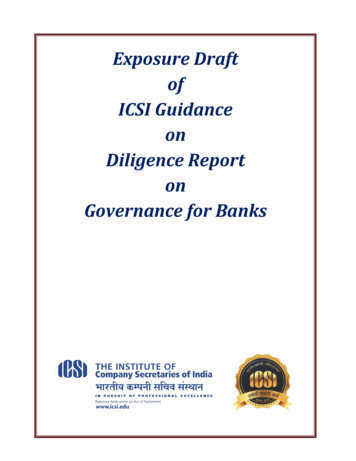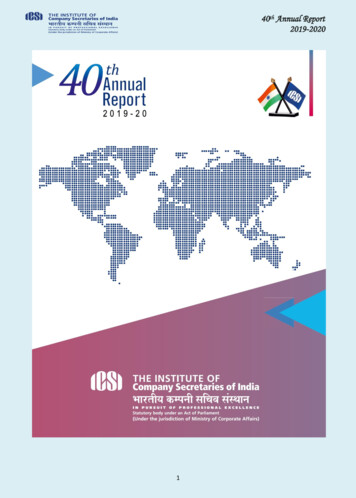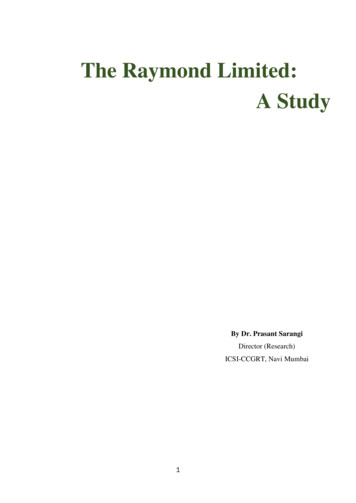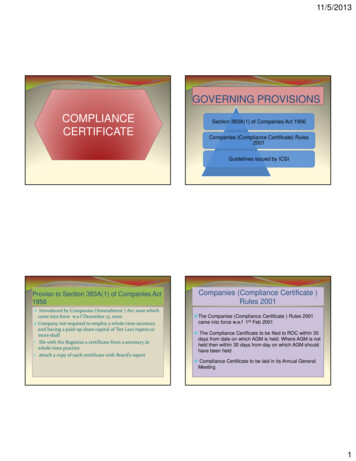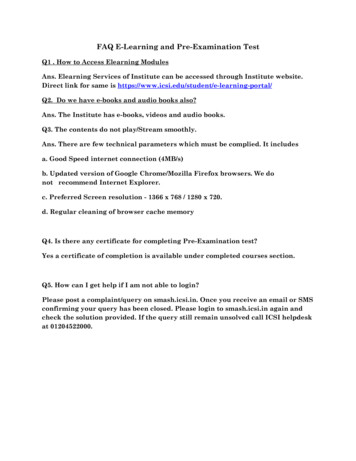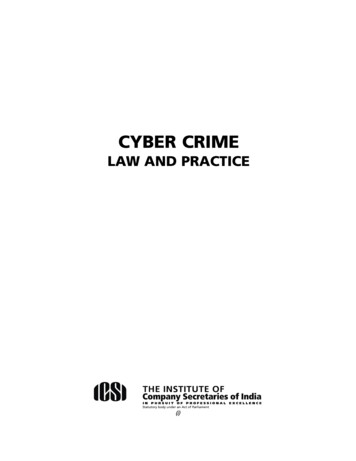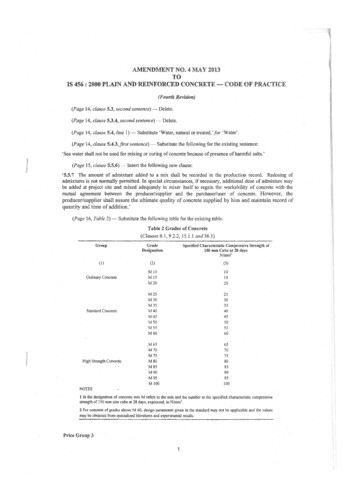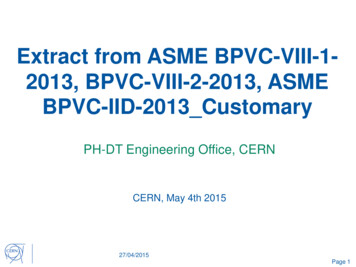
Transcription
Delhi Postal Regn. No. DL(S)-01/3197/2012-2014Licenced to post without prepayment at NDPSOLicence No. U-(C)-80/2012-2014VOL XLIIIMAY 2013Regn. No. 21778/71Posting Date : 03/04-05-2013Date of Publication : 01-05-2013NO. : 05Pg. : 505-640100/- (Single Copy)MAY 2013CHARTEREDSECRETARYTHE JOURNAL FOR CORPORATE PROFESSIONALSFocus onCHARTERED SECRETARYThe IndianFinancial Code forTomorrow’sIndia 05568SEBI Mutual Funds(Amendment)Regulations, 2013Website : www.icsi.edu
2nd CSIA International Conference on Corporate Governancefor Sustaining Prosperity and Posterity(held on April 5-6, 2013 at New Delhi)COMPANYSECRETARIESEXAMINATIONS - JUNE, 2013TIME-TABLE & PROGRAMMEDate andMORNING SESSIONAFTERNOON SESSIONDay( 9:00 AM TO 12:00 NOON )( 1:30 PM TO 4:30 PM )FOUNDATION PROGRAMME2/6/2013PROFESSIONAL PROGRAMMEEXECUTIVE PROGRAMMECompany Secretarial PracticeGeneral and Commercial LawsSunday( MODULE-I )( MODULE-I )3/6/2013Drafting, Appearances and PleadingsCompany Accounts, Cost andMondayOn the dais from left: S. N. Ananthasubramanian ( President, Council of the ICSI), Dr. Anil Khandelwal(Former CMD, Bank of Baroda), Peter Turnbull (President, CSIA), Naved Masood (Secretary, MCA),Nesar Ahmad (Chairman, CSIA Conference Organising Committee) and Sachin Pilot (Hon’bleMinister of State for Corporate Affairs I/C, Government of India), addressing.Management Accounting( MODULE-I )( MODULE-I )4/6/2013Financial, Treasury and ForexTax ish and Business CommunicationThursdayQuotes from Hon’ble Minister’s Speech“ About four hundred thousand students are currently undertaking this course tobecome company secretaries, so a decade ago this job was perhaps not as sought outbut today because of the importance of companies, the regulatory issues and the kindof compliances that we have to deliver, this job is really becoming a top ranking job andpeople across the country are aspiring to become Company Secretaries .”“ .we as far as the Indian Government is concerned are more than willing to partner withthe Institute not just in India but globally to make sure that we develop a profession that weare all proud of. That one had the best and the brightest talent coming in and taking on thisleadership role. And in the years to come, I hope that the role and the performance and thejob of the Company Secretary grows from strength to strength .”7/6/2013( MODULE-II )( MODULE-I )Corporate Restructuring and InsolvencyCompany Law( MODULE-II )( MODULE-II )Strategic Management, Alliances andEconomic and Labour LawsInternational TradeEconomics and Statistics( MODULE-III )( MODULE-II )Advanced Tax Laws and PracticeSecurities Laws andFridayCompliances( MODULE-III )8/6/2013Financial AccountingSaturdayDue Diligence and Corporate ComplianceManagement( MODULE-IV )9/6/2013Elements of Business Laws andGovernance, Business Ethics andSundayManagementSustainability( MODULE-IV )( MODULE-II )
05The CouncilPresident S. N. AnanthasubramanianVice President Harish K. VaidISSN 0972-1983CHARTERED SECRETARY[ Registered under Trade Marks Act, 1999 ]Vol. : XLIII No. 05 Pg 505-640 MAY - 2013Members(in alphabetical order) Anil MurarkaArdhendu SenArun BalakrishnanAshok Kumar PareekAtul Hasmukhrai MehtaAtul MittalB. NarasimhanGopalakrishna HegdeNesar AhmadP. Sesh KumarPradeep Kumar MittalRenuka Kumar (Ms.)Sanjay GroverSridharan RSudhir Babu CU D Choubey (Dr.)Umesh Harjivandas VedVikas Yashwant KhareSecretary M. S. SahooPresident & 508Legal World & 550From the Government & 562News from the Institute & 596Our Members & 640From theEditorial Advisory BoardChairman S BalasubramanianMembers(in alphabetical order) Ashok TyagiBharat VasaniC K G Nair (Dr.)G R BhatiaH S GroverJ P Sharma (Prof.)Manipadma Datta (Dr.)N SubramaniamO P DaniPradeep K MittalR S Nigam (Prof.)S K Dixit (Dr.)T N PandeyT V NarayanaswamyV K Bhasin FSLRC and Regulator- Government interface510Financial Sector Legislative Reforms Commission (FSLRC) Recommendations onMonetary Policy: Some Fundamental Issues515Consumer protection in the Indian Financial CodeFSLRC: Transformational and Pioneering; But will itset the cat among the pigeons?520528 Financial Consumer Protection Under the Draft Indian Financial CodeReport on FSLRC and draft IFC Emphasis on principles/techniques adoptedby the Commission New Law Relating to Income Taxation on Buyback of shares by Companies540 Immunity under the Trade Unions Act, 1926543 535Inland : Rs. 1000 (Rs. 500 for Students of the ICSI)Foreign : 100; 60 (surface mail) Single Copy : Rs. 100‘Chartered Secretary’ is normally published in the first week of every month. Non-receipt of any issue should be notified within that month. Articles onsubjects of interest to company secretaries are welcome. Views expressed bycontributors are their own and the Institute does not accept any responsibility. The Institute is not in any way responsible for the result of any action taken onthe basis of the advertisement published in the journal. All rights reserved. Nopart of the journal may be reproduced or copied in any form by any means withoutthe written permission of the Institute. The write ups of this issue are alsoavailable on the website of the Institute.Edited, Printed & Published byEditor & Publisher M. S. SahooConsulting Editor V. GopalanDesign & Printed atLegal Correspondent T. K. A. PadmanabhanB-220, Phase II, Noida-201305Gautam Budh Nagar, U. P. - India 524Annual SubscriptionM. S. Sahoo for The Institute of Company Secretaries of India,‘ICSI House’, 22, Institutional Area, Lodi Road, New Delhi- 110 003.Phones : 41504444, 45341000, Grams : ’COMPSEC’Fax : 91-11-24626727E-Mail : info@icsi.eduWebsite : http://www.icsi.edu (GN-85-118)Articles ( A 149-187 ) Chief Executive Sutanu Sinha(LW-49-59)M. P. Printers505CHARTERED SECRETARYMay 2013R
At aGlanceArticles (A 149 - 187)P-510Part - I : Articles on Indian Financial CodeFSLRC and Regulator- Government interfaceP-510Dr. K. P. KrishnanThe report of the FSLRC proposes to significiantly revamp the financial sectorregulatory governance architecture. However, its observations and recommendationson regulatory governance are important not just for financial regulators, but regulatorygovernance in India in general. Independent regulators at the national level have existed fora while, and their effectiveness has at best been mixed. This is due to the ad-hocestablishment of new regulators, and their poor legislative design. They have not had thebenefit of the perspective on regulatory design that the FSLRC has taken while proposing arevamp of the financial sector regulatory architecture. The FSLRC report proposes theenactment of the Indian Financial Code, which sets out in detail uniform standards foradministrative behaviour, for drafting subordinate legislation, and mechanisms for regulatoryindependence and accountability. This article looks at the interface between the regulatorand the government, and analyses this proposed regulatory architecture, especially themechanisms of oversight, independence, and accountability.Financial Sector Legislative ReformsP-515Commission (FSLRC) Recommendationson Monetary Policy: Some Fundamental IssuesDr. Prachi MishraThe FSLRC recommendation for developing a radically new monetary policyframework is a major step towards modernization of the institutional architecture forpolicy making in India. The three areas of fundamental reform are an explicit mandate to thecentral bank, an empowered monetary policy committee (MPC), and increased transparency.The Commission aims at a big overhaul on transparency by proposing to release thestatement of monetary policy objectives and the voting record/rationale statements of MPCinto the public domain. The recommendations, however, may fall short of achieving thegoals of autonomy of the central bank and its accountability to the public.Consumer protection in theIndian Financial CodeP-520Shubho Roy, Renuka Sane, Susan ThomasThe IFC has approached Consumer Protection as a problem which has two parts. Asin the Consumer Protection Act, 1986 it sets up a system to redress consumercomplaints after an event has occurred. However, unlike most other Indian legislation, IFCalso proposes a system to prevent consumer interests being undermined before a financialproduct or service is sold. The draft laws also carves out unsophisticated and smallconsumers from the larger set of consumers of financial services. This is done to provideextra legal action to such consumers.FSLRC: Transformational and Pioneering;But will it set the cat among the pigeons?P-524S. RameshF506inancial Sector Legislative Reforms Commission (FSLRC) presented its report tothe Finance Minister in March this year. The FSLRC has proposed a sector-May 2013neutral Indian Financial Code to replace multiple and old financial sector laws, splittingthe regulation between the Reserve Bank of India and a new Unified FinancialRegulatory Agency that will oversee the remaining financial sector. While this newhorizontal structure could serve the interests of the consumers of financial servicesmuch better, there may be practical issues to contend with. A principles-basedapproach may open every regulation drafted by a regulator to judicial challenge andmay be perhaps a little bit ahead of its time in India. If these changes have to have animpact on the broader financial sector in India in the future, there would have to bewidespread changes in the functioning of the Government and the Judiciary.Financial ConsumerProtection Under theDraft Indian Financial CodeP-528Rajkumar S. AdukiaThe primary objective of financial consumer protection is to guard consumerinterests and promote public awareness. Part IV of the draft Indian FinancialCode i.e. 56 clauses covered under Chapters 17 to 31 deals extensively with thisaspect. Some of the rights and protections proposed for consumers under the DraftCode are - protection against unfair terms of contract, protection against misleadingand deceptive conduct, right to receive the support to enter into suitable contract, rightto receive reasonable quality of service, and right to data privacy and security. Thedraft Code has also proposed the creation of a unified Financial Redress Agencywhere consumers of all financial products would be able to submit complaints.P-535Report on FSLRC and draft IFCEmphasis on principles/techniquesadopted by the CommissionNarendra Singh, Arpita BanerjeeThe Financial Sector Legislative Reforms Commission (FSLRC) was formed inMarch 2011 with a view to rewrite and harmonise financial sector laws.Although, entire financial legislative reform was ambitious, nevertheless, full scalerevamp was the need of the day as piecemeal amendments in the existing legislationsare inadequate to meet the evolving technology and financial innovations. Certainly,there was need for streamlining the financial sector regulations, reducing the numberof regulators and giving them clear mandate to discharge their duties effectively. TheCommission after detailed deliberations have come up with its Report and draft IndianFinancial Code 2013 which is based on certain elements and principles. This articleis an endeavour to analyze the elements on which the financial laws are proposed tobe based and the principle techniques adopted by the Commission in resolving thegaps, overlaps and inconsistencies in the financial sector regulations.Part - II : Other ArticlesNew Law Relating to Income Taxationon Buyback of shares by CompaniesP-540T.N. PandeyDuring the budget exercises for the year 2013-14 an anti-tax avoidance measureby way of tax on buy-back of shares in the cases of unlisted companies hasbeen introduced. It was noticed that some companies to avoid dividend distributiontax, instead of distributing dividends to the shareholders were passing on theCHARTERED SECRETARY
At aaccumulated profits to them by way of payment of higher prices through buying backshares where the capital gains arising on such shares in the hands of theshareholders were not chargeable to tax or were taxable at lower rate of tax. Thisloophole in the IT Act has been plugged. This article has examined the variousaspects of the new law and has concluded saying that the new effort to check leakageof tax may have some teething troubles, but once settled, it would work in the interestof revenue.Immunity under theTrade Unions Act, 1926P-543From the Government (GN 85 - 118) K Gopalakrishnan Nair, Lakshmi G. NairThe Trade Unions Act, 1926 is one of the principal legislations that regulate thefunctioning of the Trade Unions in India. Sections 17 and 18 of the said Actprovide immunity to the trade unions and the members of these trade unions. It isinteresting to look at the jurisprudence pertaining to these Sections and analyse thescope of this immunity and the extent to which the trade unions or the members enjoythis immunity. This article intends to analyse that. To understand this, the authorshave examined several case-laws pertaining to these Sections in the Act, which havebeen pronounced by the Supreme Court and the various High Courts in India. Theauthors believe that such an analysis will sketch the rights and restrictions of a tradeunion and its members under the Trade Unions Act and would be helpful indetermining whether the acts of the trade unions or its members are protected underthe law in India.Legal World (LW 49 - 59) LW.41.5.2013 P-550Delhi High Court explains theprovisions of sections 20 and 21 of the CompaniesAct with respect to change of name of a company.LW.42.5.2013 Delhi High Court upholds the decisionof the single judge to keep out a secured debtorfrom the scheme of compromise with creditors.LW.43.5.2013 Delhi High Court declines to wind upa company on the grounds of bonafide dispute.LW.44.5.2013 SAT upholds the SEBI order holdinga stock broker violating the Takeover regulationsbut reduces the quantum of penalty.LW.45.5.2013 Resultin
Shubho Roy, Renuka Sane, Susan Thomas T he IFC has approached Consumer Protection as a problem which has two parts. As in the Consumer Protection Act, 1986 it sets up a system to redress consumer complaints after an event has occurred. However, unlike most other Indian legislation, IFC
